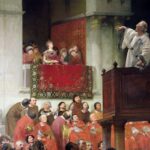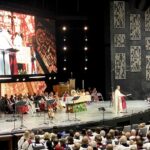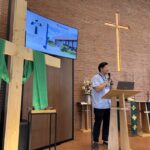By Andrew E. Harrod, PhD, JD, Esq.
In another German manifestation of the church militant, Cologne’s Archbishop Joachim Meisner drew attention to the often ignored global persecution of Christians in his December 28, 2012, sermon and to politically (but not factually) correct understandings of human nature often prevalent in modern societies. Meisner spoke on the Feast of the Holy Innocents commemorating the Bethlehem children slaughtered by King Herod in attempt to kill the baby Jesus and regarded by the early church as the first martyrs.
In his German homily text, Meisner used the occasion to direct attention “to the entire world, in which children of God, sisters and brothers of Jesus Christ are killed, harassed, and persecuted.” Meisner thereby determined that the “persecution of Christians is the worldwide most prevalent form of human rights violation and attacks.” Persecution of Christians is additionally “in Germany the most simply accepted kind and manner of human rights violation. Politics in Germany largely abandons persecuted Christians around the world.” Meisner therefore joined a growing list of German Catholic bishops who have seconded Chancellor Angela Merkel’s November 5, 2012, debated statement that Christianity is the “world’s most persecuted faith.”
Meisner admonished his listeners that they “should and may not first consider politically correct behavior and speech, but rather political thinking, speaking, and acting according to God.” Such an outlook “was probably never so take for granted. The Sinai, the mountain of God’s commandments, was not always–to the detriment of persons and peoples–viewed as being in the center of human mountain landscape.”
Yet Meisner reiterated a famous saying often quoted and heard by him in the original speech given by the leading Catholic intellectual Romano Guardini at the Berlin Catholic Conference (Katholikentag) in 1952. Speaking in East Berlin’s St. Mary’s Church (Marienkirche), “so to speak within hearing distance” of East Germany’s Communist dictator Walter Ulbricht, Guardini declared, “Only who knows God, knows the human person.” Meisner elaborated that
in order to learn to know, esteem, and love the human person, one needs the understanding of God. Wherever a society is constructed, in which God no longer appears at all, can this occur only to the detriment of the person. There conditions are created in which the person also no longer figures. Our society is on the way thereto. We have already experienced this twice in the last 80 ways. I was as a sufferer thereby present.
In discussing interrelated human and divine natures, Meisner devoted the bulk of his homily to an increased secularization of German society in past decades provoking a corresponding withering away of respect for human life and its incubator, the family unit. “Our God,” explained Meisner,
is a God of life. And the human being, created as His image, should live–here temporally and there eternally. And therefore the killing of people is a contradiction in itself, namely the killing of children, of unborn or born, but also of people grown old, is actually a scandalous revolt against the order of creation.
Meisner noted that Christian revelation proclaimed a God of several persons, namely Trinitarian in nature, because this triune God is a God of love, and “there can never be love for itself alone.” This divine nature reflects itself in God’s understanding of human nature proclaimed in Genesis 2:18: “It is not good for the man to be alone.” Thus, Meisner explains, God created humanity as a pair, “as man and woman.” The “Creator’s will is in the process inserted in the human being, so that he seeks completion in that man and woman come together in marriage and then become a third and more persons.”
This “Creation order of God” is “invented or conceived by no person, but rather is found preexisting and discovered in itself.” The recognition of this order and corresponding praxis “guarantee the peoples of the world, guarantee humanity, a blessed continuance.” “Wherever, though,” Meisner warns, “this knowledge of Creation becomes lost or is denied, there the result becomes visible in dying peoples, in the loss of marriage and family, in the devaluation of the child, namely the unborn, but also in the devaluation of the dying person.”
Pope Benedict XVI, Meisner noted, had emphasized the importance of a society’s protection for nature and species when addressing the German parliament (Bundestag). “Yet the human being,” Meisner added, “also has a nature, which must be guarded and protected. Its constants become clear in the so-called natural law. Whoever is obligated to God, the Creator, is also obligated to the Creation and to the creatures, namely the creature human being.”
Meisner admonished that man could not place himself above God. “All attempts in history according to certain political systems,” he analyzed,
to relativize marriage and family and to dispute their place in social life according to Creation always end to the detriment of the person. God’s Creation order can neither be nullified nor implemented by parliamentary decisions. This order is valid independent of parliaments. Therefore every person needs for his existence and essence a father and a mother. These are facts that do not need to be proven. The order of Creation, which we also call natural law, is not the result of a societal training, but a rather a truism placed in the nature of the person for his existence. The family is thus of a not high enough to treasure meaning and importance for the person as an individual, but also for a people. The over-aging of our German people is indeed no event of nature, but rather is grounded in a perverse conception of marriage and family.
Meisner concluded that the “human person is no god, but he is of a divine origin. The person retains his dignity when he remains conscious of his ancestry, and he remains certain of his responsibility assigned to him as a fellow person and creature.” With this responsibility the human person “is blessed when he remains tied to the will of the Creator.” Meisner spoke out on the Feast of the Holy Innocents “not to accuse and injure, but rather to protect, care for, and nurture the order of Creation; so that for the human being circumstances remain guaranteed in which he can fully unfold himself.” In this respect Meisner admonished that each person remained “obligated to God” Who after earthly death would ask each person the question from Genesis 4:9: “Where is your brother Abel?” In a relativist era, Meisner’s words were hardly politically correct, but nonetheless necessary on both sides of the Atlantic.





Pingback by A Congressman’s Crusade for Human and Religious Rights – FrontPage Magazine | EthioSun on January 15, 2013 at 4:35 am
[…] are admirable exceptions, but many church leaders have not spoken out for the persecuted consistently and […]
Pingback by A Congressman’s Crusade for Human and Religious Rights » Choosing Life - God's Gift To The Unborn on January 15, 2013 at 7:07 am
[…] are admirable exceptions, but many church leaders have not spoken out for the persecuted consistently and […]
Pingback by A Congressman’s Crusade for Human and Religious Rights « Juicy Ecumenism on January 15, 2013 at 1:39 pm
[…] are admirable exceptions, but many church leaders have not spoken out for the persecuted consistently and […]
Pingback by A Congressman’s Crusade for Human and Religious Rights at Catch The Fire Ministries on February 7, 2013 at 5:00 pm
[…] are admirable exceptions, but many church leaders have not spoken out for the persecuted consistently and […]
Pingback by Pope Benedict XVI Calls Christians the “Most Persecuted People” « Juicy Ecumenism on February 11, 2013 at 10:11 am
[…] The Pope’s comments follow a series of public statements in his native Germany highlighting hostility to Christians around the world already reported by the Institute on Religion and Democracy (IRD). Speaking before her fellow Lutherans on November 5, 2012, for example, German Chancellor Angela Merkel caused national debate when she called Christianity “most persecuted religion in the world.” The Catholic archbishop of Freiburg, Baden-Würtemberg, Robert Zollitsch, then seconded Merkel on December 21, 2012, stating that “Christians currently are the most persecuted religion in the entire world.” As previously announced by the German bishops conference headed by Zollitsch before his statement, the Catholic Church in Germany observed a day of prayer for Christians persecuted worldwide on December 26, 2012, the Feast of St. Stephens, Christianity’s first martyr. Two days later Cologne’s Archbishop Joachim Meissner marked the Feast of the Holy Innocents (commemorating the Bethlehem children slaughtered by King Herod in an attempt to kill Jesus) with a sermon in which he called “persecution of Christians…the worldwide most prevalent form of human rights violation.” […]